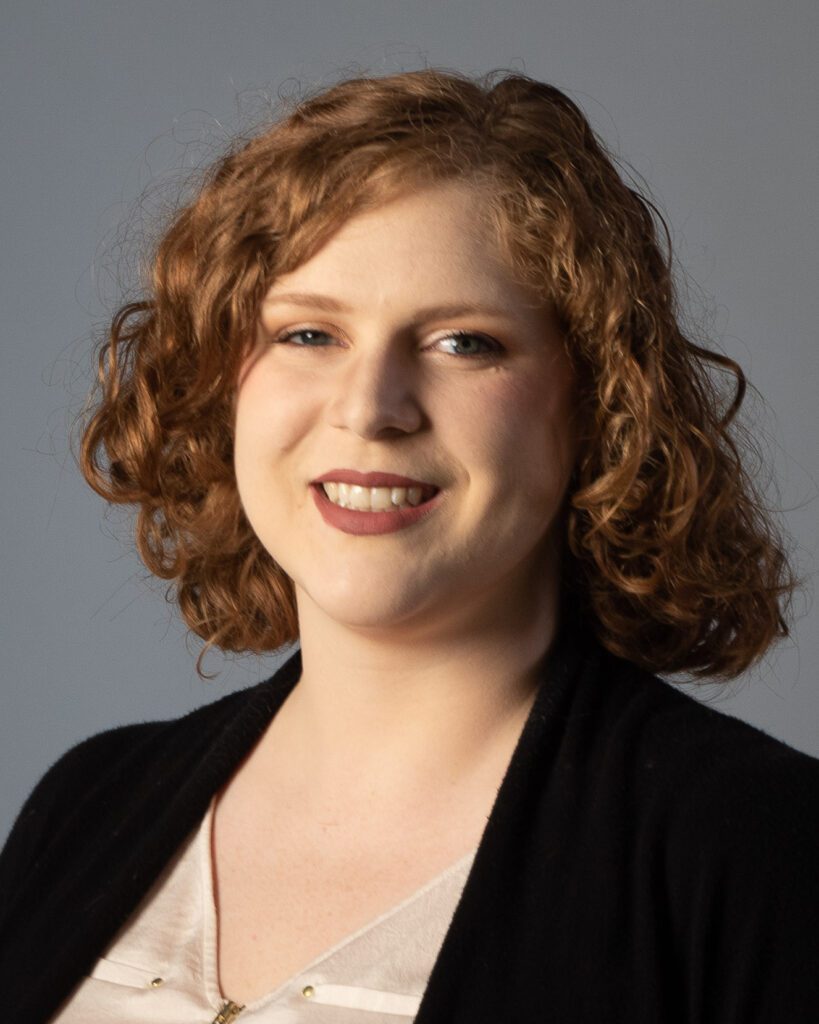Lexie Kuzmishin Nagy, Earlham College assistant professor of biochemistry, is one of nine Indiana educators selected for the PALSave Open Educator Award.
PALSave, a program of the Private Academic Library Network of Indiana (PALNI), encourages innovation and excellence in support of higher education through the adoption of Open Educational Resources (OER) instead of traditional textbooks. OER consist of free learning materials like e-books that are available in the public domain or on copyright under an open license.
“High textbook costs continue to be a barrier to education, yet these individuals work tirelessly to make course materials more equitable and accessible to all students,” said Amanda Hurford, PALNI’s Scholarly Communications Director and PALSave project lead.
“With every single one of PALNI’s 24 supported institutions participating in PALSave, faculty and staff are reshaping the educational landscape, ensuring that every student, regardless of circumstance, has the opportunity to learn, thrive, and succeed,” she said. “They have built a community of champions for affordable learning, and we’re excited to see their efforts benefit students now and well into the future.”
Among Indiana’s PALSave leaders
Kuzmishin Nagy is the latest Open Educator Award recipient from Earlham — Professor of Chemistry Lori Watson was selected in 2022 — and her work expands upon the College’s commitment to access and affordability.
Since the program’s inception in 2019, faculty from across all four of Earlham’s academic divisions have participated in the PALSave program. Earlham is second in average savings per student ($82.26), and third in the percentage of students enrolled in courses with free textbooks (1,134) compared to enrollment data at the program’s start.
“OER support my pedagogy and reduces the equity gap in my classes,” Kuzmishin Nagy said. “Rather than using an expensive biochemistry textbook for a single upper-level class, I use various open textbooks to provide students with a foundation before diving into scientific journals to explore a topic. OER reduces the financial burden of education for my students, while also giving me flexibility in how to approach topics in biochemistry.”

“Open Educational Resources support my pedagogy and reduces the equity gap in my classes. Rather than using an expensive biochemistry textbook for a single upper-level class, I use various open textbooks to provide students with a foundation before diving into scientific journals to explore a topic. OER reduces the financial burden of education for my students, while also giving me flexibility in how to approach topics in biochemistry.”
Lexie Kuzmishin Nagy
Reimagining the textbook
Kuzmishin Nagy successfully applied for a course redesign grant from PALNI in summer 2022 and participated in a webinar and online course sponsored by the consortium. She also reviewed textbooks as part of the grant process.
“I didn’t want to rely on a single textbook for an advanced class that should be primarily based on literature and research,” she said. “No one textbook really covered the level of detail I was looking for. I envisioned a course that borrowed pieces of different textbooks.”
Working with PALNI resulted in a more comprehensive textbook, the professor notes.
“Although I presented this as a biochemistry course and I’m a biochemist, I realized that I was actually pulling a lot of helpful content from microbiology, molecular biology, immunology and medicine, to kind of showcase how these scientific ideas about proteins and nucleic acids can be applied in different fields,” Kuzmishin Nagy said. “I think the course materials ended up being even better because my students could have access to all of these different perspectives. I loved that.”
In addition to the advanced biochemistry course, Kuzmishin Nagy also teaches beginning chemistry and biology courses that use OER adopted by her colleagues.
“Lexie’s work to redesign her courses demonstrates her commitment to helping all students succeed in her classes. Traditional chemistry/biology textbooks could cost students $200-300 to purchase,” said Karla Fribley, instructional technologies director, seminaries librarian and PALSave liaison. “These changes benefit everyone in the class, because each student has quick and ready access to course materials. I’m also appreciative of the creativity Lexie demonstrated in her revisions. She has drawn on content from various disciplines–going above and beyond what a single traditional textbook could offer.”
Supported by Lilly Endowment, Inc., PALSave has impacted 24,000 students across the state since its inception in 2019. Program leaders say 260 courses have been transformed resulting in savings of about $2.2 million.
Media contact
Brian Zimmerman
Interim co-vice president of marketing and communications
Email: [email protected]
Phone: 765.983.1256